The Beginning and the Ending
Should the Bible be spiritualized?

This article is one I have been ruminating about for some time. It was about three years ago when the Lord laid the title on my heart. I began praying about it and searching the Scriptures and turning it over and over in my mind.
Finally, the message began to burn in my heart for a release, and so I decided to pull it together for presentation at our annual Bible conference.
I consider it to be a personal testimony about my faith. As such, you may not agree with what I have to say, but I hope you will respect it, even as I respect those fellow believers who would disagree with me.
Introduction
Let’s get started by taking a look at the words that begin and end the Bible.
The Bible begins with these words: “In the beginning, God created the heavens and the earth” (Genesis 1:1).
The Bible ends with these words: “He [Jesus] who testifies to these things says, ‘Yes, I am coming quickly.’ Amen. Come, Lord Jesus” (Revelation 22:20).
The Bible begins with a revelation. The Bible ends with a promise.
Do you believe these words? Do you really believe them without reservation?
If you do, then you are an exception to the norm, for the fact of the matter is that the vast majority of professing Christians — both Catholic and Protestant, including even Evangelicals — do not accept the plain sense meaning of these verses.
The reason is that the beginning and ending of the Bible are the two most abused areas of God’s Word. That’s because they have been spiritualized into meaninglessness.
The Abuse of Spiritualization
For those of you who may not be familiar with the term, spiritualization, let me explain that it means to argue that the plain sense meaning of Scripture is not its true meaning.
Let me give you a classic example of spiritualization taken from the writings of a theologian by the name of Loraine Boettner. It has to do with his interpretation of Zechariah 14:1-9.
That passage says that in the end times Jerusalem will be surrounded by enemy forces and will be ready to fall to them when the Lord will suddenly return to the Mount of Olives. When His feet touch the Mount, it will split down the middle. The Lord will then speak a supernatural word that will instantly destroy all the enemy forces. And on that day, the Lord will become King over all the earth.
In his commentary on this passage, Boettner completely spiritualized it.1
He argued that the Mount of Olives stands for the human heart. The enemy forces symbolize the evil in this world that surrounds and attacks the heart. The Lord’s return represents what happens when a person accepts Jesus as Lord and Savior.
Thus, when Jesus comes into a person’s heart, their heart (the Mount of Olives) splits in contrition, and all the evil influences in the person’s life are defeated, and Jesus becomes king of that person’s heart.
That’s what I call an exercise in imagination!
Personal Experience
I personally know a lot about spiritualization because I grew up in a church that specialized in this perversion of Scripture. Let me give you an example, and once again, it relates to Zechariah 14, verses 1-9.
I discovered that passage when I was 12 years old, and I couldn’t believe my eyes when I read it, because all the preachers I had ever heard had been hard core Amillennialists — people who do not believe that Jesus will ever return to this earth to reign for a thousand years. Over and over I had heard these preachers proclaim, “There is not one verse in the Bible that even implies that Jesus will ever put His feet on this earth again.”
Well, here was a passage that did more than imply. It said point blank that the Messiah will return to the Mount of Olives and that when His feet touch ground, the mountain will split in half!
So, in fear and trembling, I went to my pastor, showed him the passage, and asked what it meant. He studied it a long time, and then he stuck his finger in my face and said, “Son, I don’t know what this passage means, but I will guarantee you one thing, it doesn’t mean what it says.”
Why People Spiritualize
People love to spiritualize the Scriptures because when they do so, they can make the Bible say whatever they please, and in the process they get to play God.
Most professing Christians today are members of churches whose leaders use spiritualization to play fast and loose with the beginning and ending of the Bible. The preaching and teaching they hear is based upon spiritualization, and it converts the opening chapters of the Bible into a mythical story, and the ending of the Bible into mythical promises.
The Beginning
Regarding the origins of our planet and life, the Bible plainly reveals that both were created by God in six days about 6,000 years ago.
Christendom seemed to have no problem with this revelation until the 19th Century. Scientists before that time — even the man acknowledged to be the greatest scientist in history, Sir Isaac Newton — believed the biblical story and affirmed it in their writings.
The Attack of Science
But in the 19th Century, scientists began to challenge the biblical story, reaching its culmination with Darwin’s Theory of Evolution which was proposed in 1859 in his book, On the Origin of Species.2
As the 20th Century began, the Bible was on the defensive, and the battle came to a climax with the Scopes Trial in 1925 when William Jennings Bryan tried to defend the biblical view while Clarence Darrow mocked and scoffed.3
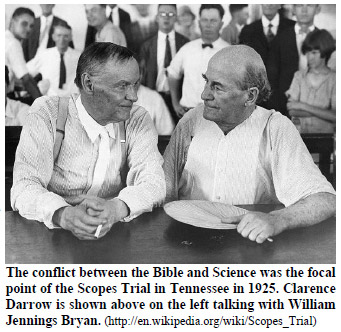
The Christian Response
In response to the relentless attacks of scientists, Christian theologians scrambled to try to make the biblical story line up with the claim of the scientists that the universe was billions of years old and that all life had evolved haphazardly from a single source.
This was accomplished primarily in one of two ways, or a combination of both.
First, was the Day-Age Theory that converted each day of the Genesis creation week into a million or more years.
The second was the Gap Theory. According to this idea, there is a gap of millions or billions of years between the first two verses of Genesis.
There are different versions of the Gap Theory, but all versions postulate that God’s original creation was most likely corrupted by the rebellion and fall of Satan. Then millions or billions of years later, God decided to bring order out of the chaos by re-creating the earth and its heavens. Some who subscribe to the Gap Theory believe that the re-creation process took only 6 literal days. But most would contend that each of the days were actually millions of years.
They thus combine the Gap Theory with the Day-Age Theory and end up with a creation process that took place over a time span of billions of years.
The Situation Today
Today, the Gap Theory, or some version of it, is held by most Christians — even Evangelicals. Many believe that God intervened at some point and created Man.
But many, if not most believe in Theistic Evolution. In other words, they believe God created all life, but that it emerged over a long period of time through a process of guided evolution.
When challenged to simply believe the creation story in the Bible, they often respond with scoffing.
Personal Experiences
I experienced this early in the history of this ministry when I was speaking to the combined adult Sunday School classes of a church in Oklahoma. I just happened to mention in passing that we should accept the Genesis story of creation to mean what it says — namely, that God created the universe and life supernaturally in six literal days some 6,000 years ago. That off-the-hand remark prompted an explosion! A man jumped to his feet and started yelling. “I can’t believe that you believe such nonsense,” he shouted. He then added, “It’s ignorant people like you who make Christians look like fools!” At that point, he stomped out of the room.
Here’s another example of what I’m talking about. In 2009 we aired a series of television programs with Dr. Jobe Martin who has a great ministry that focuses on the Creation-Evolution conflict.4 In one of those programs, he told why he believes the Genesis story of creation means exactly what it says.
In response, I received a letter from a Christian who watched the program via satellite in Latvia, one of the former Russian Baltic Republics. He wrote:
Is the cause of Christ really advanced by having on your show a wild-eyed fanatic who cannot comprehend the concept of proof? Possibly we are not talking about the same Creator? My Lord can not lie, thus, He cannot create an old-looking earth to deceive the modern man… Satan’s best troops in the battle to stymie Christianity are the Young Earth advocates. There are hundreds of reasons that speak of earth’s age, but the wellmeaning fools refuse to learn some science before they argue against it… Dear sir, preach what you will but not in the name of Christianity. Do not make my Lord a deceiver and Christians an uneducated lot.
And lest you think these are isolated examples, let me point out that a group of Evangelicals have formed an organization called BioLogos whose purpose is to convince Christians that “the process of evolution is a tenable biblical position, and… is the best Christian apologetic to defend Genesis 1-3 against its critics.”5
This group has actually taken the position that if Christians do not accept the theory of evolution, the Church will soon die off, because it will be rejected as “an insignificant cult.”6
The relevance of this issue was demonstrated recently on the cover of Christianity Today magazine, published in June 2011.7
This is a magazine founded in 1956 by Billy Graham to espouse and defend biblical truths. But in recent years, it has become increasingly liberal, while still claiming to be Evangelical.
The magazine’s cover featured a drawing of Adam as a Neanderthal looking person, and the lead article presented him as being most likely a mythical person. The article is also a shameless apologetic for Theistic Evolution.
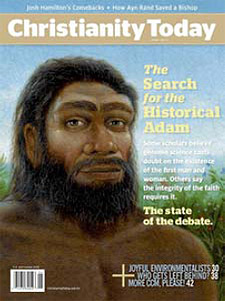
Key Questions
Let’s consider for a moment some of the key questions that are always posed by those who scoff at the Genesis account of creation:
1) How do you account for the apparent age of the earth?
2) How do you explain the fossil records?
3) How do you explain the fact that light from distant stars is reaching us — light that would have taken millions of years to arrive?
4) How do you explain the complexity of life without millions of years for it to develop?
On and on the questions go.
From a secular viewpoint, the questions appear to present an invincible argument against the biblical story. But from a faith viewpoint, they do not present insurmountable problems.
A Fundamental Principle
That’s because all of these questions can be answered by one simple observation: Special creation always carries with it the impression of age.
Thus, if I were to create a full grown tree instantly and then reveal it to you, you would argue that it was at least 10 to 15 years old. Or, if I were to create a full grown man instantly and then introduce him to you and ask you to guess his age, you would probably say he was at least 18 years old.
In both cases, there would be an appearance of age, but it would be an illusion.
A Second Consideration
Another factor to consider is that the earth looks old because it is in bondage to decay.
The original earth was perfect, and the Bible indicates that it was encased in a thick vapor canopy and that there was lush vegetation throughout the earth (Genesis 1:6-8, 20).
But that earth was spoiled by the sin of Man. When Adam and Eve rebelled, God responded by putting a curse on the earth, and all of creation was put in bondage to decay. (If you don’t believe it, just go look in a mirror!)
That second earth was then further changed radically by the Noahic Flood that suddenly created great mountains and chasms. Consider the Grand Canyon, for example. It appears to have developed as the result of millions of years of erosion. But we know from the Mount St. Helens eruption in 1980 that such canyons can be created literally overnight.8 They do not require great eons of time.
A Basic Issue
The lack of a need for time brings us back to a basic issue. The Bible teaches that God is omnipotent (Matthew 19:26). He could therefore have created the whole universe in the twinkling of an eye. He did not need time.
He chose instead to create the universe and all life in 6 days because the Bible says He wanted to give us a model for life — namely, 6 days of labor followed by one day of rest.
Answering the Skeptics
Let’s return now to the questions posed by the skeptics:
1) How do you account for the apparent age of the earth?
Answer: The apparent age is just that: it is apparent and not real. The original earth looked old when it was created, and that appearance of age has been accelerated by the curse of God which put the whole universe in bondage to decay.
Nor is it dishonest of God to create an earth that looks old. Again, the appearance of age is a corollary of special creation. Furthermore, God has clearly told us how He created in His Word. How can He be accused of deception when He has told us how He did it?
2) How do you explain the fossil record?
Answer: The fossil record is not a record of age. Rather, it is the record of an event — the Noahic Flood.
3) How do you explain the light of the distant stars reaching the earth?
Answer: God created the light already reaching the earth. Therefore, what we observe today through a telescope is what has been happening to those stars since 6,000 years ago when they were created.
4) How do you explain the complexity of life without millions of years for it to develop?
Answer: God doesn’t need time for special creation. Thus, when Jesus converted water into wine at the marriage feast in Cana, He did so instantly, proving He was the God of time (John 2:1-11). With God, there is no need for time.
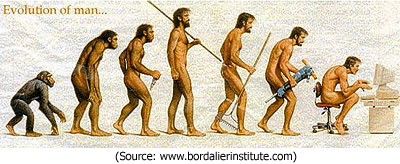
Improper “Solutions”
To try to solve the contradiction between scientific theory and the biblical story by using the Gap Theory or the Day-Age Theory or both is an admission that God needs time.
One problem with the Gap Theory is that it appears to contradict Scripture. Consider this verse from Isaiah 45:18 —
“For thus says the Lord, who created the heavens, (He is the God who formed the earth and made it, He established it and did not create it a waste place, but formed it to be inhabited), I am the Lord and there is none else.”
God did not create the earth and then allow it to become a “waste place” for billions of years before restoring it to His original intention — as a home for Mankind.
Another problem with both the Gap Theory and the Day-Age Theory is that they contradict the teaching of the Bible that death did not exist until the sin of Adam and Eve. That’s because both theories propose that life evolved slowly over a long period of time, and there was constant life and death long before Mankind, resulting in the survival of the fittest. That assumption of life and death before Man is directly contrary to Scripture.
Evolution
The whole theory of Evolution is the greatest fairy tale ever concocted by the depraved mind of Man.
The complexity of both the universe and life attests to intelligent design and the necessity of a Creator. To deny this is equivalent to standing in front of Mount Rushmore and saying, “Wow! Isn’t it amazing what can be accomplished accidentally by erosion?”
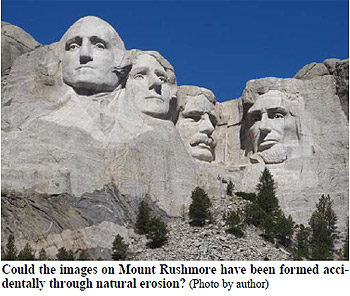
A scientist would write off such a person as insane. Yet, that same scientist will then turn around and argue that both the universe and life evolved accidentally. It is no wonder that Ray Comfort wrote a book entitled, You Can Lead an Atheist to Evidence, But You Can’t Make Him Think.9
Take, for example, the theory that the creation of the universe began billions of years ago with a Big Bang. This theory is based on supposed evidence that the universe is expanding.
But the Bible has an explanation for this. Eleven times we are told in the Scriptures that God “stretched out the heavens” from the point of creation. Here is one example taken from Isaiah 42:5 —
“Thus says God, the Lord, who created the heavens and stretched them out, who spread out the earth and what comes from it, who gives breath to the people on it and spirit to those who walk in it…” (ESV)
If the universe truly is expanding, then it is most likely left over momentum from God’s stretching of the heavens.
The whole idea of the universe originating from a “big bang” explosion is preposterous. Let me ask you a simple question: How many explosions have you ever witnessed or have heard of that produced order instead of chaos?
And how many explosions have ever occurred from nothing? In that regard, I love a poster I discovered recently that pokes fun at the Big Bang Theory. It says, “In the beginning there was nothing — which exploded.”
The whole idea of the universe and life originating from an explosion is as absurd as thinking — as some Evolutionists have postulated — that if you would only give 10,000 monkeys enough time, they would eventually produce the entire works of Shakespeare by randomly tapping the keys on typewriters!
Just a Theory
And concerning the Theory of Evolution, it is just that — a theory. The scientific method requires observation. No scientists were present to observe the creation of the universe or life. The only one who was present has revealed to us in His Word how it happened.
The reality is that the advocates of the Theory of Evolution have been running for cover ever since the discovery of DNA and its incredible complexity. Thus, Richard Dawkins, one of the world’s leading evolutionists, recently said that his current best guess is that life on earth either came here floating on crystals in space, or else it was planted here by aliens.10
The bottom line is that these so-called scientists are unwilling to admit the existence of a Creator God because then they would be responsible to someone.
The Bible sums it up best. In the Old Testament it says, “The fool has said in his heart, ‘There is no God'” (Psalm 14:1). In the New Testament it says: “Even though they [speaking of ungodly people] knew God, they did not honor Him as God… but they became futile in their speculations… Professing to be wise, they became fools” (Romans 1:21-22).
The Days of Genesis 1
Let’s return to the biblical text. We are told in Genesis 1 that God created the universe and life in six days and then rested on the seventh. How do we know they were six twenty-four hour days? The answer is simple. We know the text is speaking of 24 hour days, because it says so! Each day is described literally as an “evening and a morning.”
The fact that the Genesis account is speaking of 24 hour days is affirmed in Exodus 20:8-11 —
8) Remember the Sabbath Day, to keep it holy.
9) Six days shall you labor and do all your work,
10) But the seventh day is a Sabbath of the Lord your God; in it you shall not do any work.
11) For in six days the Lord made the heavens and the earth, the sea and all that is in them, and rested on the seventh day…
6,000 Years of History
And how do we know all this happened only about 6,000 years ago? Because the biblical genealogies going back to Adam and Eve cover a time span of only 6,000 years from today’s time.
And Jesus Himself said in Mark 10:6 that the beginning of creation dates from Adam and Eve: “…from the beginning of the creation, God made them male and female.”
In this regard, I think it is interesting to note that the Bible is the only written account of human civilization that provides historical information before the flood of Noah that took place some 4,300 years ago. All other records of human history, such as the Chinese and Egyptian, date back only to the time of the flood.
Carbon Dating
But what about carbon dating? Hasn’t it revealed human skeletons much older than 6,000 years, as well as animals like dinosaurs that are even millions of years old?
The problem with carbon dating is that it is based on evolutionary assumptions — the primary one being the principle of uniformitarianism, which is the scientific theory that life on earth has been uniform ever since the beginning and therefore the carbon content in the atmosphere has always been the same.
Even those who put their faith in carbon dating will admit that if there ever was a world-wide flood, then all carbon-dating is inaccurate. But they deny the occurrence of any such worldwide catastrophe, even though there is overwhelming evidence of it throughout the earth and there are references to it in the folk lore of all ancient civilizations.
Science Book
Some skeptics respond at this point by saying, “The Bible is not a science book, so we cannot take seriously what it says about scientific matters.”
It is true that the Bible is not a science book, but it is also true that when the Bible speaks about scientific matters, it speaks with authority and truth. In fact, it would be impossible for the Bible to contradict true science because God is the author of both.
Below are listed some examples of scientific truth that can be found in the Bible, and these examples are only a few of those that could be cited. All these scientific principles were expressed in the Bible long before they were “discovered” by scientists.
- The earth is a sphere suspended in space (Isaiah 40:22 and Job 26:7)
- Atmospheric circulation (Eccl. 1:6)
- Ocean currents (Psalm 8:8)
- The hydraulic cycle (Isaiah 55:10)
- Life is in the blood (Leviticus 17:11)
- The First Law of Thermodynamics (2 Peter 3:7, 13) — this is the law of the conservation of mass and energy that was not discovered until 1850.
- The Second Law of Thermodynamics (Romans 8:21) — all of creation is in bondage to decay. (Also discovered in 1850.)
- Basic laws of hygiene (Leviticus 11-15)
Regarding the final point above, the basic laws of hygiene outlined by Moses in the book of Leviticus were far superior to anything practiced in ancient times, whether in Egypt or anywhere else.
During the period of the Great Plague in Europe in the 14th Century, the Jews were often blamed for it because their infection rate was far less than the general public. But their seeming immunity was due to the practice of the Mosaic laws of hygiene. (Keep in mind that this was a time in history when people took baths only once a year — and then, only if they really needed one!)
To further illustrate how far ahead of science the hygienic laws of the Bible were, consider the incredible story of Ignaz Semmelweis.11 He was an Hungarian doctor who was practicing medicine in Vienna in 1847 when he noticed the high rate of infection and death in the obstetrics ward. He observed that the doctors were performing vaginal exams after having done autopsies. Assuming they were transferring something from the dead bodies, he suggested they start washing their hands after completing the autopsies. This resulted in a dramatic improvement, but the idea was still rejected by the medical community as nonsense. He died before the germ theory of disease was developed in the 1860’s by Louis Pasteur and Joseph Lister.12
So What?
Some of you may be thinking at this point, “So what? What difference does it make how the Genesis record of Creation is interpreted?”
Let me assure you that it makes a lot of difference.
For one thing, the integrity of the Bible as the Word of God is at stake. For example, if we cannot believe what the Bible says about the Creation, then how can we believe what it says about the Resurrection? Or what it says about the return of Jesus?
And that brings me to the ending of the Bible.
The Ending
Like the Beginning, the Ending of God’s Word has been spiritualized into meaning anything except what it says.
The viewpoint of End Times that prevails in the Church today — both Catholic and Protestant — is Amillennialism, the belief that there will never be a millennial reign of Jesus on this earth.
This view is based on a spiritualization of Scripture.
The Biblical View
The Bible says point blank Jesus will return to this earth to reign for a thousand years (Revelation 20:4). It further states that Satan will be bound during that time (Revelation 20:1-3), and that the earth will be flooded with peace, righteousness and justice as the waters cover the seas (Isaiah 9:6-7 & Isaiah 11:9).
The Bible also teaches that at the end of that reign, this earth will be consumed with fire and out of that fiery inferno will come a new earth that will serve as the eternal home of the Redeemed (2 Peter 3:12-13 and Revelation 21:1). It also teaches that God will come down to earth and that the Redeemed will live in glorified bodies in His presence forever (Revelation 21:2-4).
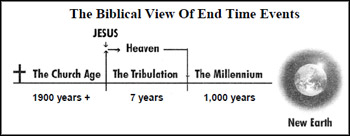
The Amillennial View
The Amillennial viewpoint spiritualizes all of this.
It argues that the Millennium began at the Cross with the binding of Satan and that the Millennium continues to this day with Jesus reigning from Heaven through His Church. In other words, the Church Age is the Millennium. There is no Rapture in this viewpoint, nor is there any Great Tribulation.
Most Amillennialists would further argue that when Jesus returns, He will simply appear and then take all believers, both living and dead, back to Heaven with Him to live eternally in an ethereal spirit world.
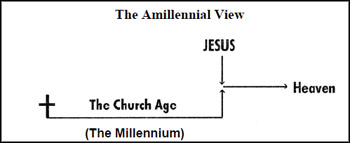
The problems with this view are overwhelming.
1) If we are in the Millennium now, why isn’t the world flooded with peace, righteousness and justice?
2) If Jesus is reigning now, why is He doing such a poor job? After all, every nation in the world is in rebellion against Him. And if He is reigning now as King of kings, then why does the Bible portray Him instead as our High Priest before God’s throne? (Hebrews 3:1 and Hebrews 4:14-16).
The Bible says Jesus came the first time as our Savior. He currently serves as our High Priest. He will return as our King of kings.
3) If Satan is bound now, then why does evil abound in the world, and why do Scriptures written long after the Cross portray him as continuing to be the ruler of this world?
Furthermore, the Bible says Satan is going to be bound in a special way during the Millennium. He will be restrained so that he can no longer deceive the nations of the world. Yet, everywhere we look today, we see nations deceived.
4) What would God have to do to convince us that Jesus is returning to reign for a thousand years?
Repeatedly throughout the Old Testament we are told that the Messiah will reign over all the world from Mount Zion in Jerusalem (Isaiah 2:1-4; Isaiah 9:6-7; Daniel 7:13-14, 18, 27; and Micah 4:1-7). And in chapter 20 of the book of Revelation we are told six times that His reign will last 1,000 years.
5) Finally, how do you explain eternity in an ethereal world as a spirit being when the Bible says we will live forever in glorified bodies on a new earth? (Revelation 21:1-7).
Interpretation
It all comes down to a matter of interpretation.
As with the interpretation of the beginning of the Bible, the interpretation of the ending depends upon whether you are going to accept the plain sense meaning of the text or whether you are going to insist on spiritualizing the text to mean what you want it to mean.
I believe the fundamental rule for the interpretation of all the Bible, from beginning to end should be what I call the Golden Rule of Interpretation:
If the plain sense makes sense, don’t look for any other sense, lest you end up with nonsense.
Furthermore, when it comes to the interpretation of prophecy, there is a fundamental fact that must be kept in mind — namely, all First Coming prophecies were literally fulfilled in their plain sense meaning. Why, then, would the Second Coming prophecies be any different?
Conclusion
The bottom line is that we need to stop playing games with God’s Word. We need to accept it for what it says — and stop trying to make excuses for it.
Hundreds of times, in both the Old Testament and the New Testament, the claim is made that the writers of the Bible are speaking the Word of God (1 Samuel 9:27 and Hebrews 4:12). If so, then what they wrote must be without error, for God cannot lie, nor can He make mistakes.
I therefore challenge you to accept the Bible for what it claims to be — the Word of God — and I challenge you to believe it for what it says.
And I want to conclude by emphasizing that my challenge to you to accept the Bible for what it claims to be, and to believe it for what it says, is a challenge that comes directly from Jesus Christ Himself. Here is what He is recorded as saying in John 5:46-47:
“…if you believed Moses, you would believe Me, for he wrote about Me. But if you do not believe his writings, how will you believe My words?”
Moses was the one who wrote the book of Genesis. We need to believe what he wrote.
Your Christian faith will have full meaning only when you believe that the universe and the life it contains was supernaturally created by God for a purpose.
And you will never experience the fullness of Christian hope until you start believing the promises of God’s Prophetic Word.
The Beginning and the Ending —
May God forgive us for ignoring them.
May God forgive us for abusing them.
May God forgive us for playing games with them.
May we commit ourselves to their revival in the teaching and preaching programs of our churches.
God was there at the beginning. He will be there at the end. He holds the whole universe in His hands. Let us find peace in the knowledge that He is sovereign.
“My message and my preaching were not in persuasive words of wisdom, but in demonstration of the Spirit and of power, that your faith should not rest on the wisdom of men, but on the power of God.”
(The Apostle Paul in 1 Corinthians 2:4-5)
Notes
1) Loraine Boettner, The Millennium (Phillipsburg, NJ: P&R Publishing Co., 1957).
2) Charles Darwin, On the Origin of Species (London: John Murray Publisher, 1859).
3) Dr. David Menton, “The Scopes ‘Monkey Trial’ — 80 Years Later,” www.answersingenesis.org/docs2005/0711scopes.asp. It should be noted that Bryan did not believe in a young earth. He took the Day-Age position, arguing that each day of creation represented millions of years.
4) Jobe Martin’s outstanding book about his conversion from Evolution to Creationism is titled, The Evolution of a Creationist. It can be obtained from Lamb & Lion Ministries for $15 plus the cost of shipping. To order, call 972-736-3567.
5) The BioLogos Forum, About The BioLogos Foundation, http://biologos.org/about.
6) Lawrence Ford, “Confronting Evolutionary Ideas,” www.icr.org/article/confronting-evolutionary-ideas, 2011.
7) Richard N. Ostling, “The Search for the Historical Adam,” www.christianitytoday.com/ct/2011/june/historicaladam.html, June 3, 2011.
8) Dr. Steven A. Austin, “Mt. St. Helens and Catastrophism,” www.icr.org/article/mt-st-helens-catastrophism, 1986.
9) Ray Comfort, You Can Lead an Atheist to Evidence, But You Can’t Make Him Think (Washington, D.C.: WND Books, 2009).
10) William Hooper, “Richard Dawkins on Intelligent Alien Design,” www.theoligarch.com/richard-dawkins-aliens.htm, May 2008, updated January 2011.
11) Wikipedia, “Ignaz Semmelweis,” http://en.wikipedia.org/wiki/Ignaz_Semmelweis.
12) Wikipedia, “Germ theory of disease,” http://en.wikipedia.org/wiki/Germ_theory_of_disease.




